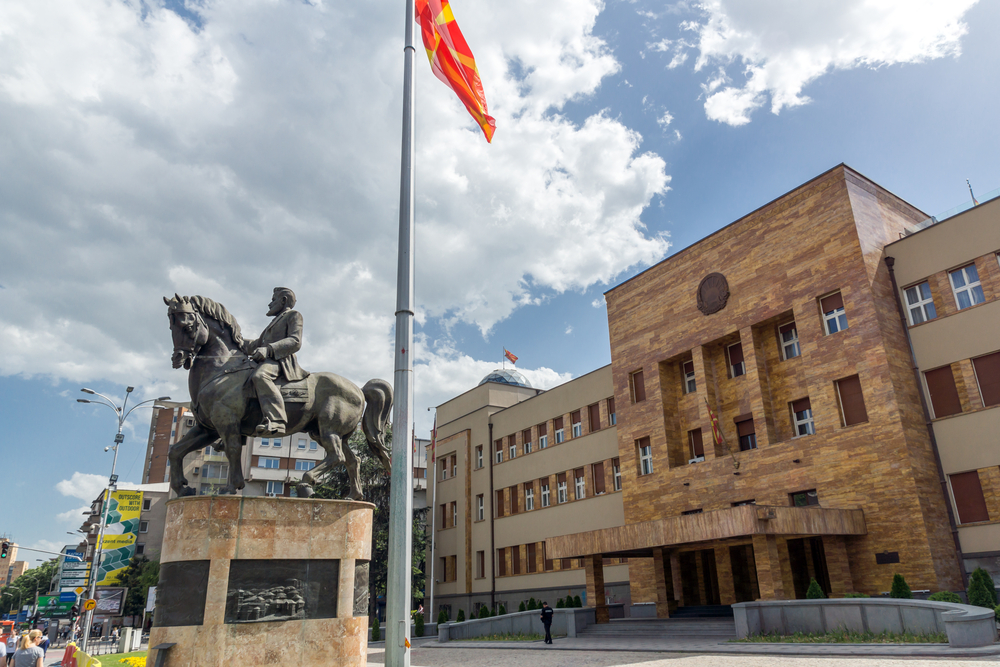Skopje parliament – © stoyanh/Shutterstock
With the election of a caretaker government, new parliamentary elections will be held in North Macedonia next May. A difficult task for the next parliament will be to review the constitution to relaunch the country’s European path
Significant political changes are expected in North Macedonia in 2024: the process began on January 28, when the Skopje parliament elected a new transitional technical government. The new “technical” ministers will remain in office for one hundred days until the new parliamentary elections scheduled for 8 May.
Since 2016, to put an end to the political crisis that began in 2015, the country’s political forces have agreed to elect a transitional technical government one hundred days before the regular parliamentary elections, representing both the previous government and the opposition, in order to guarantee fair and democratic elections.
In 2016, the then-opposition SDSM staged mass protests after reporting that the VMRO-DPMNE government had illegally spied on and recorded political dissidents, citing evidence of abuse of power.
The current government, led by the social democrats of the SDSM, left the post of prime minister to the Democratic Union for Integration (DUI), which finally kept its promise to give the country an Albanian prime minister. The current president of the Assembly, Talat Xhaferi, will lead the government until the May elections.
The center-right opposition VMRO-DPMNE did not vote and did not accept Xhaferi as prime minister, even though the party participates with several ministers and deputy ministers in the new caretaker government.
“It is not right that the party that has the fewest deputies, as well as the one associated with the greatest number of corruption scandals, receives the position of prime minister,” explained Antonio Miloshoski, VMRO-DPMNE MP.
“SDSM and LPD, faithful partners of the DUI, today made the Macedonian people tenants of their own country and staged a humiliating dualization of the country.” Miloshoski then added that the ministers proposed from the ranks of the VMRO-DPMNE will control the ministers of the coalition of government.
DUI leader Ali Ahmeti underlined that Xhaferi’s election is historic for both Albanians and Macedonians, as well as for all other ethnic groups present in the country, because it realizes the idea of an egalitarian state and society and overcomes all existing ethnic prejudices.
The May elections themselves are the result of a political agreement, as they were initially scheduled for July. The agreement was reached in December 2023 between the political parties now represented in parliament.
The compromise follows the failure of the current parliament in 2023 to obtain a two-thirds majority to amend the Constitution and include Bulgarians as an official minority, a condition set by Sofia to allow North Macedonia to start membership negotiations to the EU.
The governing parties, SDSM and DUI, assured that they would receive the support of several VMRO-DPMNE deputies to approve the controversial constitutional reform, obtaining the desired 81 votes out of a majority of 120 deputies, but this never happened.
After the agreement for new elections, then-Prime Minister Dimitar Kovacevski declared that, after 17 years of political turmoil, fair parliamentary elections would finally be held in North Macedonia. The last ones held after a regular execution of the mandate were in fact held in 2006.
“This means that the Government has succeeded in creating further stability, certainty and predictability. This is a big step after the state and institutions were prisoners of politics until just under ten years ago,” Kovacevski said at the time.
In 2023 Hristijan Mickoski, leader of the VMRO-DPMNE, called for there not to be the creation of a caretaker government one hundred days before the elections, but immediate elections.
Disagreements between the political parties arose when Bulgaria invoked its veto to block North Macedonia’s accession to the EU from 2020: according to Sofia, the Macedonian language is simply a version of Bulgarian with another name, while North Macedonia does not recognize its cultural and historical ties with Bulgaria.
At the same time, Sofia demands that a Bulgarian minority be officially included in the Constitution of North Macedonia. The proposal that arrived from France in June 2023, during the Paris presidency of the EU, offered a series of measures to overcome the current deadlock, measures that were accepted by the Macedonian government, while the opposition firmly rejected them.
The May 2024 parliamentary elections will also coincide with the regular presidential elections: the first round to elect a new head of state will take place on April 24, while the second round of both elections will take place on May 8.
This will be the eleventh parliamentary and eighth presidential election since the country’s independence in 1991. The caretaker government led by Xhaferi will be the third elected to manage the electoral process. The previous two were led by Emil Dimitriev of VMRO-DPMNE in 2016 and Oliver Spasovski of SDSM in 2020.
The newly elected technical government is made up of twenty ministers including the prime minister. Since Talat Xhaferi has left office, SDSM’s Jovan Mitreski will be the new Speaker of Parliament until May.
Talat In 2001, during the armed conflict, he defected from the ARM and joined the Albanian National Liberation Army, later being amnestied after the Ohrid Agreement. In the past he was also defense minister.
Have you thought about a subscription to OBC Transeuropa? You will support our work and receive preview articles and more content. Subscribe to OBCT!
Comments, where possible, are screened by our staff before being made public. The time required for this operation can vary. Go to our policy
